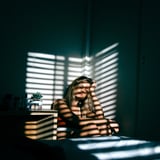mardi 28 avril 2020
I Have a Panic Disorder. Here's How I'm Coping With the Coronavirus Pandemic.

For weeks, many of us have been sheltering in our homes in an effort to limit the spread of the novel coronavirus. The frustration and boredom of being inside for so long can be miserable for just about anyone - but it's hard to convey the experience of being confined at home, while also having a panic disorder. My symptoms have seemed to only grow more intense with each news update. I can feel my shoulders get heavier and a knot of anxiety tighten inside me, overwhelmed not only by the fear of becoming sick, but also the uncertainty about the future.
Even under normal circumstances, I had a panic attack at least once every month. Panic attacks are not the same as a rush of anxiety; mine are marked by sudden dizziness, chest pain, and the feeling that my heart is pounding. They crop up without warning. My first panic attack happened when I was 20 years old and attending a concert. I wasn't anxious, as one might expect. In fact, I was having a good time, until midway through the concert when I felt my shoulders grow heavy and I became dizzy. Suddenly, I had this fear that I was dying, and I had to leave the venue. The attack lasted about 15 minutes, but for the next couple days, I was almost in a haze. The panic attacks I've experienced since then come on just as abruptly - I have maybe a few seconds of warning, and all I can do is sit down with my head between my knees and wait it out.
Through the years, I've learned that having a routine helps a lot. Just knowing what to expect from my day and being able to avoid any crowds and stress-inducing situations gives me a sense of control. Unfortunately, staying at home during this crisis has taken away any semblance of structure. Instead, I find myself scrolling through my phone, mindlessly refreshing social media apps. With every cough or change in body temperature, I begin to panic, checking the symptoms of COVID-19 for what feels like the millionth time. On top of that, my mind is constantly thinking of what I should be doing or worrying about what's going to happen after all of this over. The situation we're in is unprecedented, and because of this, I feel my grip on the future slipping away.
I remind myself constantly that this is all temporary. In time, the world will return to normal.
I know many people, with or without a panic disorder, are feeling a little unhinged during this time. For me, creating a schedule for my housebound days has helped. Every night, I write down what I'm going to do the following day. I've been doing light workouts like yoga and Pilates, which help keep my mind off the news and the possibility of another panic attack. I've finally picked up the books I've been trying to finish for months, and I've even started taking some online courses - like 18th century opera and Mandarin Chinese - to busy myself with studying. I find positive distractions essential to keeping my mind clear.
While it helps to develop these types of coping skills, I've found that it's just as crucial to stay connected to friends and loved ones. It may not be possible to do so in person right now, but daily phone or video calls can help bring your energy back when you're feeling low.
Finally, I remind myself constantly that this is all temporary. In time, the world will return to normal, and we'll go back to school or work and regain the structure we're currently lacking. When that happens, the anxiety and panic attacks I struggle with won't suddenly disappear - and so, I'm more grateful than ever for those who stay by my side during hard times. Not just during this global crisis, but every day I'm fighting a battle that's mine alone.










0 comments:
Enregistrer un commentaire